Page 52 • (1,065 results in 0.021 seconds)
-
In the business and non-profit worlds, the skills necessary for developing new ideas transcend the academic boundaries found within universities.
in Business and Economic History. Dr. Halvorson worked at Microsoft and was an early PC programming enthusiast and book author. Halvorson teaches courses on U.S. business and economic history, the history of technology, and innovation for social impact. Regular contributions to Innovation Studies comes from faculty in Business, Communication, Computer Science, Data Science, Economics, English, History, Philosophy, Political Science, and Psychology. For a complete list of the PLU faculty members
-
PLU is the small, private university in Tacoma, Washington where everyone shares a bold commitment to expanding well-being, opportunity, and justice.
PLU MBA ALUM WORK Alumni Success StoriesApril Rose Nguyen ’19 G’21“At Amazon, if you just vocalize that you’re interested in something, normally your manager or somebody that you talk to will look for a way to help you get involved in that project.” April Rose was a double major in political science and communication and earned an MBA at PLU in 2021. April Rose is a full-time program manager at Amazon. Josh Wallace ’19Josh Wallace got an MBA from PLU in 2019 to better understand different aspects
Graduate AdmissionPacific Lutheran University 12180 Park Avenue South Tacoma, WA 98447-0003 -
8th WANG CENTER SYMPOSIUM Migration: Towards an Interdisciplinary and Cross-Cultural Understanding of Human Mobility
, international cooperation, and conservation. These debates and questions, in turn, are reshaping nations’ political futures through the dismantling of long-sought-after civil and human rights, of geopolitical unions like the EU, and of trade pacts such as the Trans-Pacific Partnership. These same debates threaten to dissolve unprecedented climate accords such as the Paris Agreement, the global action plan that seeks to limit global warming to well below 2°C by the end of this century. The 2018 Wang Center
Wang Center for Global and Community Engaged Education868 Wheeler St. Tacoma, WA 98447 -
Speaker: Bob Ferguson, Washington State Attorney General Introduced by Dr. Roberto Dondisch, Mexican Consul Location: Karen Hille Phillips Center for Performing Arts
Human Trafficking and Migration Speaker: Greg Hermsmeyer ’88, Senior Coordinator for International Programs in the Office to Monitor and Combat Trafficking in Persons (TIP) at the U.S. Department of State Introduced by Ann Kelleher, Emeritus Professor of Political Science Location: Regency Room 1:45 - 3: 25 p.m. | Welcoming the Stranger II: Organizational Approaches to Immigrant and Refugee Resettlement, and Human Trafficking Panelists: Liz Dunbar, Linda Faaren ’78, Sarah Peterson and Kerri Pedrick
-

Passion Play shows three communities, Queen Elizabeth’s England, Hitler’s Germany, and Reagan’s America, attempting to stage the death and resurrection of Christ. The play takes the audience on a humorous, but unsettling journey as it examines the intersection of religion and politics. The play is…
, that’s a hugely important aspect of faith that often gets overlooked. I come from a Lutheran family, and religion and spirituality are very important to me – especially exploring all aspects of religion and spirituality and asking the hard questions.” The play explores some weighty issues, and Heath believes the subjects to be relevant to today’s political environment. “For me, the main theme of this play is the importance of questioning your beliefs, and really looking into how things are connected
-
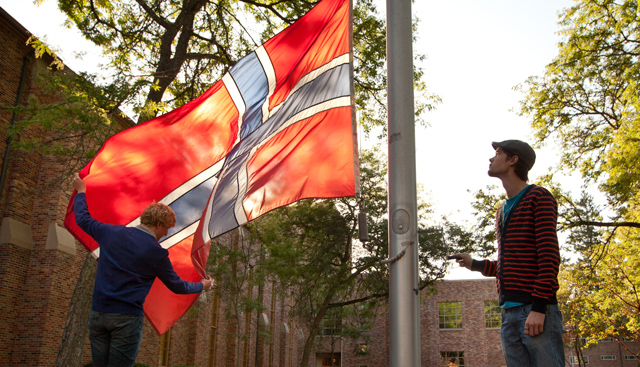
During a ceremony of remembrance in Red Square, the Norwegian Flag is raised for the victims of the terror attacks this summer. (Photo by John Froschauer) PLU professor remembers Norway’s peaceful response to attacks of terror By Katie Scaff ’13 The dignity and resolve of…
Norway teaching at an international school on the day a right-wing extremist bombed government buildings in Oslo and, a short time later, massacred young people attending a political party youth camp on the island of Utøya. Berguson shared photos and video from the moments and days following the attacks to help recap what happened from a firsthand perspective. “What perhaps could not be fully captured in the media was the profound silence,” Berguson said. “Violence of innocent people at the hands of
-
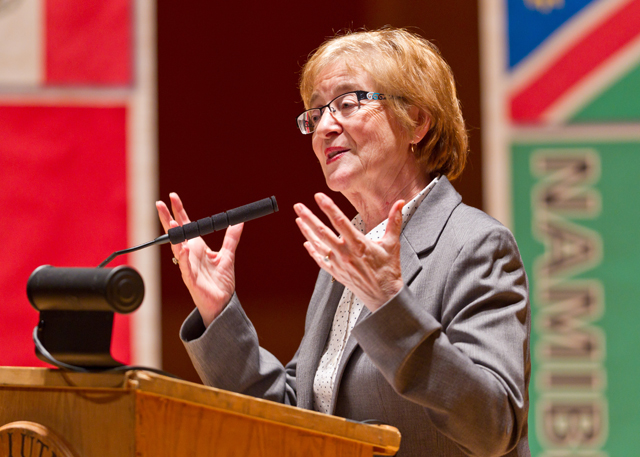
Maude Barlow – National Chairperson of the Council of Canadians and chair of the board of D.C.-based Food and Water Watch – delivers the keynote address opening the Wang Symposium, “Our Thirsty Planet”on Feb. 23 at PLU. (Photo by John Froschauer) ‘Water is the great…
wing you come from.” But it isn’t just a matter of legislation and blame can’t be placed solely on corporations and governments, Barlow said. The fault lies with all of us, and all of us buying into “the myth of abundance.” First our attitude toward water needs to change, and then we need to see how water relates to other issues, such as education or political exploitation. “Water is the great teacher. It opens everything,” Barlow said. “Dare I say, we have to start seeing water as sacred.” Read
-
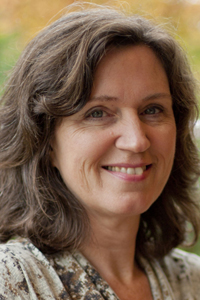
Engineer turned poet named Washington State Poet Laureate By JuliAnne Rose ’13 Realizing her passion and remarkable talent for poetry in her thirties, engineer-turned-poet Kathleen Flenniken’s work was bolstered when she received Washington State Poet Laureate earlier this year. Kathleen Flenniken ’07 was named the…
, Flenniken experienced firsthand the social implications and secrecy surrounding the events of the Hanford nuclear site, which she explores in her book, Plume. “I’m interested in the way our personal lives interact with the political direction of our country,” said Flenniken of her poetic inspiration. “Thinking about secrecy and the damage it can do to a community and to a society.” In addition to her work with young students, Flenniken also engages with poets across the state by highlighting their wide
-
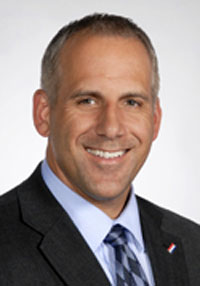
State Farm MBA Executive Leadership Series Fall 2012 Business leaders throughout industry come to PLU to share their insight through the State Farm MBA Executive Leadership Series. Lectures are held in Leraas Hall, Rieke Science Center from 6 to 7 p.m., with refreshments served from…
region during her tenure. Krise earned a B.A. in Business from Hanover College in Indiana and an M.B.A. from Miami University of Ohio. Read Previous Lutheran Studies conference examines the Lutheran perspective on political life Read Next Voices from empty chairs COMMENTS*Note: All comments are moderated If the comments don't appear for you, you might have ad blocker enabled or are currently browsing in a "private" window. LATEST POSTS Caitlyn Babcock ’25 wins first place in 2024 Angela Meade Vocal
-
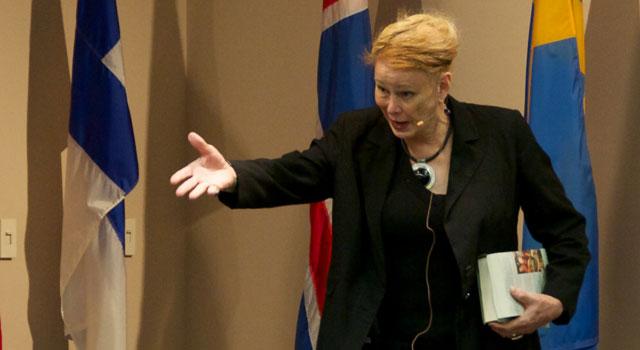
Deirdre N. McCloskey – distinguished professor of economics, history, English, and communication at the University of Illinois at Chicago – spoke about the value of the middle-class during the annual Dale E. Benson Lecture in Business and Economic History. (Photo by John Struzenberg ’15) The…
innovations is not the worst for human character. Commercial deal is not the worst life for a human-being. It forms character if it’s honest capitalism, if it’s virtuous, if it’s not just maximizing the bottom line,” McCloskey said. “What an active participant in an active bourgeois society is trying to do after all is make a product or service that other people benefit from.” Economics and Political Science double major Bernice Monkah ’13 was among those in attendance. Monkah was surprised by McCloskey’s
Do you have any feedback for us? If so, feel free to use our Feedback Form.


